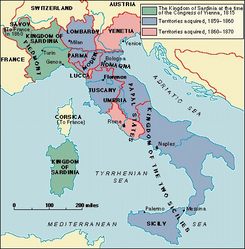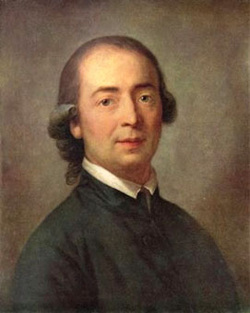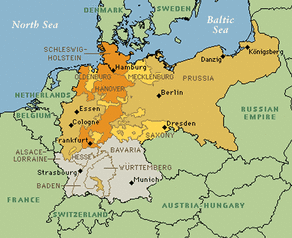History
Unification Movements

Italy: Guiseppe Mazzini founded the political movement of “Young Italy”. The goal of this movement was to create a united sovereign Italian republic Resorgimento, literally translating to “The Resurgence” was the term coined during the Italian Unification movement. It applied to the cultural and political revival of Italy during the 19th century. In Italy, national identity was constantly up in the air prior to the unification movement. It was only after the Napoleonic era that Italians developed an interest in unifying. At that time, people put aside their regional differences for the possibility of acheiving independence from foreign rule.
The Italian language has been considered an important part of national identity. After the unification, foreign speaking people were considered to be intruders. During the fascist era, as a means of establishing a better national unity, fascists discriminated against and banned the use of foreign language. It is clear that forming a strong identity has always been very important to the Italians. They did not have any sense of national identity prior to the unification, and after, they have been very strict about preserving their customs, while preventing any foreign influence. The unification itself came about due to the peoples’ desire to associate themselves with people who shared their interests. This is the main cause for unification, and also adds to the development of a person’s empathy because of their similarities to people like them. This relates to the RSA video titled The Empathic Civilisation. From that video, I concluded that religion has a very similar affect on people than that of nationality. It gives people a sense of belonging and pride. Perhaps the reason why religion is so strong is that you don’t have to live in a particular place to feel connected to other members of your group.
Germany: In Germany, unification came less as a result of the people's desire to become one. Instead, Prussia's determination to control a unified state for the military and economic benefits was the driving factor behind unification. Otto von Bismarck, the main figure in the movement, embarked on a policy of militarism as a means to bring together the people of Germany. He held that the issue of unification would be settled by industrializing and by building a stronger army, a policy he called "Blood and Iron". Although the motives behind German unification were not as sentimental to the people as in Italy, the Germans wanted to have a country to call their own. Throughout history, Germany had always been a loose confederation of independent states. The people in the states lacked pride in their homeland. The people developed consciousness of their nationality as German people and wanted to acquire a sense of oneness.
The Italian language has been considered an important part of national identity. After the unification, foreign speaking people were considered to be intruders. During the fascist era, as a means of establishing a better national unity, fascists discriminated against and banned the use of foreign language. It is clear that forming a strong identity has always been very important to the Italians. They did not have any sense of national identity prior to the unification, and after, they have been very strict about preserving their customs, while preventing any foreign influence. The unification itself came about due to the peoples’ desire to associate themselves with people who shared their interests. This is the main cause for unification, and also adds to the development of a person’s empathy because of their similarities to people like them. This relates to the RSA video titled The Empathic Civilisation. From that video, I concluded that religion has a very similar affect on people than that of nationality. It gives people a sense of belonging and pride. Perhaps the reason why religion is so strong is that you don’t have to live in a particular place to feel connected to other members of your group.
Germany: In Germany, unification came less as a result of the people's desire to become one. Instead, Prussia's determination to control a unified state for the military and economic benefits was the driving factor behind unification. Otto von Bismarck, the main figure in the movement, embarked on a policy of militarism as a means to bring together the people of Germany. He held that the issue of unification would be settled by industrializing and by building a stronger army, a policy he called "Blood and Iron". Although the motives behind German unification were not as sentimental to the people as in Italy, the Germans wanted to have a country to call their own. Throughout history, Germany had always been a loose confederation of independent states. The people in the states lacked pride in their homeland. The people developed consciousness of their nationality as German people and wanted to acquire a sense of oneness.
Nationalism

Johann Gottfried von Herder
During the 19th century, nationalism was the most powerful ideology in Europe. In Germany and Italy, it became a unifying force. The father of nationalism, Johann Gottfried von Herder, defined nationalism in terms of a people's language, literature and history, which gives them a sense of identity. His ideas were instrumental in bringing about the desire of peoples under the control of a different country to establish a state of their own. Although Herder's ideas were meant to be cultural, they were applied to political ideologies. When people acquire a greater feeling of peoplehood through an appreciation of their heritage, they move toward the idea of self government.
Communism

Communism creates a classless society. There is no rich and poor. Everyone is on the same level. Thus, communism eliminates the problem of poverty. However, communist governments impose harsh restrictions on the population. There is strict censorship of novels, movies, and newspapers. People cannot discuss any ideas that the government does not approve of. This type of government, although beneficial to the economy, strips people of their identities. People are told what to do, and cannot choose what profession to enter, or even how many children they are allowed to have. Freedom of expression, which is vital to formation of an identity, is destroyed. The hopes and aspirations that characterize people's personality are suppressed for people living in a communist country. The nature of communism is truly detrimental to the standard of living because people live in fear without exposure to the rest of the world. The dictatorial form of government scares people into forgetting their opinions and developing blind obedience to the leader. The goal of the governments is to govern people that will do whatever they are told. Without an ability to formulate opinions, people may lose a sense of self.
Works Cited
Modern European History by Birdsall S. Viault
http://www.age-of-the-sage.org/history/map_german_unification.gif
www.nndb.com/people/280/000093998/herder-1-sized.jpg http://www.nytimes.com/2011/03/04/opinion/04brooks.htmlhttp://www.intech.mnsu.edu/leey/07.133_154.pdf:
http://www.intech.mnsu.edu/leey/07.133_154.pdf:http://www.tomdispatch.com/blog/170608/tomgram%3A__chernus,_an_american_identity_crisis_in_a_losing_war/ http://www.radicalpsychology.org/vol7-1/mendible.html http://www.itiscannizzaro.net/Ianni/booksweb/pirandello/immagini/map29ita.jpg http://summitupperschool.org/lgarrett/files/2010/10/israeli_palestinian.gif http://www.oswego.edu/news/images/large/rahbarweb.jpg
http://www.wall-maps.com/Classroom/HISTORY/World/UnificationOfItaly1859.gif
http://www.wall-maps.com/Classroom/HISTORY/World/UnificationOfGermany1816.gif
http://1.bp.blogspot.com/-5HmKnAoqs2c/Ta8W40jgCyI/AAAAAAAAAA0/LcmKw_-GXr4/s1600/the-picture-of-dorian-gray-7.jpg
http://www.headzwillrollnyc.com/wp-content/uploads/2010/12/siddhartha-book-cover.jpg
http://2.bp.blogspot.com/_noctMig5B1U/TAaTWELN6UI/AAAAAAAAFas/zAtc1FzByyo/s1600/Communism.jpg
http://fouss.pbworks.com/f/identities.JPG
http://www.mathvizza.com/visualization/additive_identity.jpg
http://www.artchive.com/artchive/l/leonardo/monalisa.jpg
http://www.age-of-the-sage.org/history/map_german_unification.gif
www.nndb.com/people/280/000093998/herder-1-sized.jpg http://www.nytimes.com/2011/03/04/opinion/04brooks.htmlhttp://www.intech.mnsu.edu/leey/07.133_154.pdf:
http://www.intech.mnsu.edu/leey/07.133_154.pdf:http://www.tomdispatch.com/blog/170608/tomgram%3A__chernus,_an_american_identity_crisis_in_a_losing_war/ http://www.radicalpsychology.org/vol7-1/mendible.html http://www.itiscannizzaro.net/Ianni/booksweb/pirandello/immagini/map29ita.jpg http://summitupperschool.org/lgarrett/files/2010/10/israeli_palestinian.gif http://www.oswego.edu/news/images/large/rahbarweb.jpg
http://www.wall-maps.com/Classroom/HISTORY/World/UnificationOfItaly1859.gif
http://www.wall-maps.com/Classroom/HISTORY/World/UnificationOfGermany1816.gif
http://1.bp.blogspot.com/-5HmKnAoqs2c/Ta8W40jgCyI/AAAAAAAAAA0/LcmKw_-GXr4/s1600/the-picture-of-dorian-gray-7.jpg
http://www.headzwillrollnyc.com/wp-content/uploads/2010/12/siddhartha-book-cover.jpg
http://2.bp.blogspot.com/_noctMig5B1U/TAaTWELN6UI/AAAAAAAAFas/zAtc1FzByyo/s1600/Communism.jpg
http://fouss.pbworks.com/f/identities.JPG
http://www.mathvizza.com/visualization/additive_identity.jpg
http://www.artchive.com/artchive/l/leonardo/monalisa.jpg

